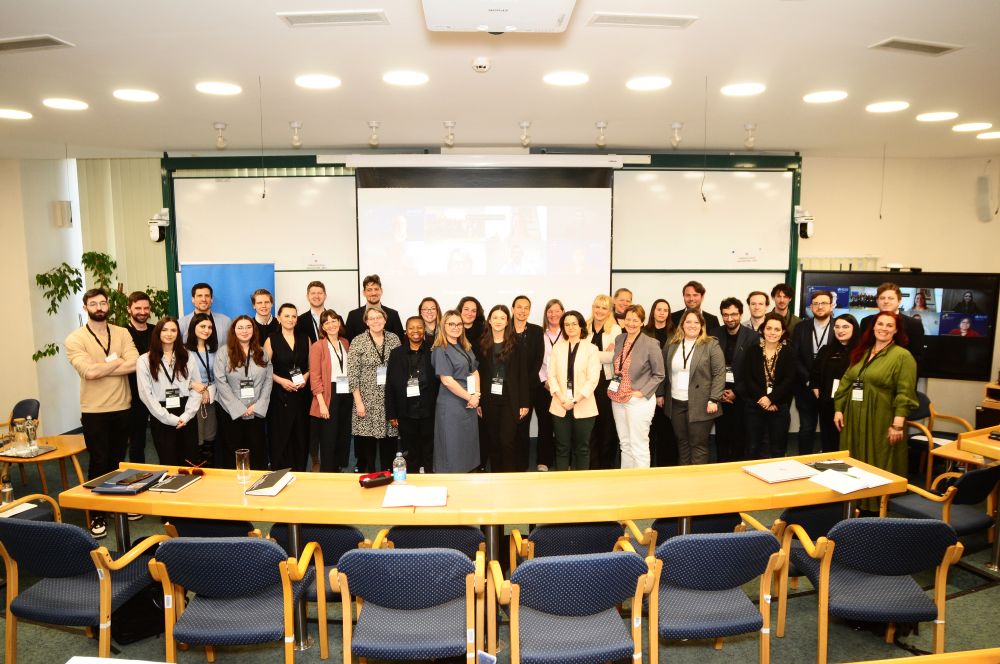Conference highlights – Combating workforce challenges
Health Services Management Training Center, Semmelweis University – WHO Collaborating Centre on Human Resources for Health Development and Data-driven Health (Hungary) had the honour to co-host the “Responding to challenges in health and care workforce: innovative research, policies and practices” conference in Budapest in 20-21 March 2025.
The event was jointly organized by the EUPHA and Health and Care Workforce Section, in collaboration with the WHO Regional Office for Europe/Programme on Human Resources for Health, the European Observatory on Health Systems and Policies and the Portuguese Institute of Hygiene and Tropical Medicine (IHMT) – WHO Collaborating Center on Health Workforce Policy and Planning (Portugal).
The conference gathered more than 60 experts from various fields, as it aimed to foster knowledge exchange and policy dialogue between researchers, policymakers, and practitioners across Europe and beyond. The conference was opened by the President of the EUPHA HCWF Section Dr. Marius Ungureanu and the local Conference co-president Dr. Eszter Kovács, Head of Unit of the Health Workforce Planning Knowledge Centre in Semmelweis University.
Two high-level panels exchanged in the topics of “Research and policy insights on health and care workforce challenges” and “Policy and advocacy for a resilient health and care workforce”. Both panels emphasized the key challenges of workforce shortages and retention issues and highlighted the importance of continuous improvement of workforce planning and strategic actions.
Ms. Lisa Baldini (AGENAS) from the Joint Action HEROES presented the ongoing action implementation from 19 countries focusing on data, models and capacity building. “As Lisa Baldini pointed out, the following reflections emerged during the HEROES project, offering insight into key challenges and promising practices identified along the way.”
One of the most common issues is the difficulty of forecasting healthcare workforce demand. Estimating demand is much more complex than supply, which can be influenced through measures like the number of university students, admissions, and targeted training programs. Demand, however, involves more intricate factors, such as demographic shifts, technological advancements, and less predictable variables.
What can be done? The first step is to model the gap in demand and supply in the present. She mentioned a study from Norway, where they have established a good practice. They have created indicators to estimate both the number and full-time equivalents of the personnel needed to meet the population’s healthcare service demand.
Although we can estimate the number of doctors needed in the future, fully predicting healthcare system dynamics is much more complex.
Secondly the challenge of monitoring international mobility. While some countries have already collaborated, sharing data on the movement of healthcare professionals remains a significant hurdle.
Thirdly she highlighted the task shifting and skill mix concept, which has already shown promising results in other projects. But to plan align with that requires ideally that we have to design our models using a competence-based approach and integrate qualitative data, like task shifting. For this Sweden can be a good example, they are developing a conceptual framework. However, this has not yet been fully developed. Still now we are not ready to introduce qualitative variable in our models.
The last topic is the need for robust, evidence-based, informed policies. This requires high-quality, reliable data and expertise capable of effective planning. What we need is continuous investment in data collection, model maintenance, and the expertise to apply these effectively. A formalized planning process is crucial, achievable through effective coordination between planners and policymakers.
She emphasized that ultimately, there’s no one-size-fits-all solution; each of the 19 countries requires tailored approaches.
Ms. Katarzyna Ptak-Bufkens (European Commission DG Sante) also underlined the joint work with other directorates beyond health and significance of sustainable health workforce for Europe. New roles of health professionals and skill-mix were mentioned as emerging trends that shape the already complex process of workforce development by Dr. Tomas Zapata (WHO Regional Office for Europe) and Dr. Gemma Williams (European Observatory on Health Systems and Policies). A strong emphasis was put on governance by Dr. Ellen Kuhlmann, and how European MS could actually reach their goals for self-sustainable health workforces. The two Members of the European Parliament Mr. Vlad Voiculescu and Dr. András Kulja spoke about the concrete steps they have taken for an EU-level strategy to address workforce shortages, including legislative or financial instruments. Ms. Federica Margheri (European Health Management Association) brought the aspects of leadership and management into discussion and presented the BeWell project’s coordinated approach for fostering a sustainable, fair and resilient ecosystem, with a clear blueprint for sectoral cooperation. Dr. Monica Brinzac (EUPHA) spoke about the challenges in advocacy efforts and the most effective advocacy strategies.
Panel discussions were organized by WHO Regional Office for Europe/Programme on Human Resources for Health on Health Workforce Optimization, and by the European Observatory on Health Systems and Policies on Digital Skills. The focus of these panels already showed the future directions for workforce development. Considering the scarce resources, it is essential to find innovative ways in workforce management, particularly along performance and utilizing the benefits of digital transformation. Conclusions of these discussions draw the attention to good governance, multi-stakeholder strategies for advanced resilience, strong collaboration and compassionate leadership in managing change.
Conference participants could listen up to 40 oral presentations and posters about the latest research findings in key focus areas including strategies to manage workforce migration, enhance mental health and well-being, promote inclusion, and address recruitment and retention challenges. The two WHO Collaborating Centers from Portugal and Hungary shared their previous experiences and scope of work in order to foster expertise exchange and further joint work.
We thank EUPHA HCWF Section for choosing Budapest in 2025, and we thank all colleagues who worked hard in making this conference happen from the communication, IT team and all the colleagues of the Health Workforce Planning Knowledge Centre.
More information: https://hwrconference.publichealth.ro/




